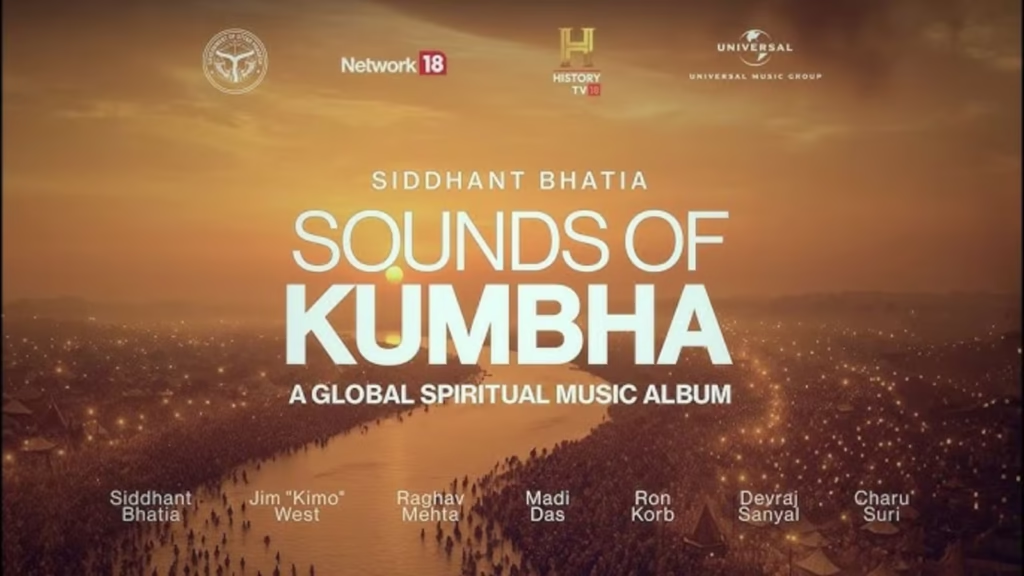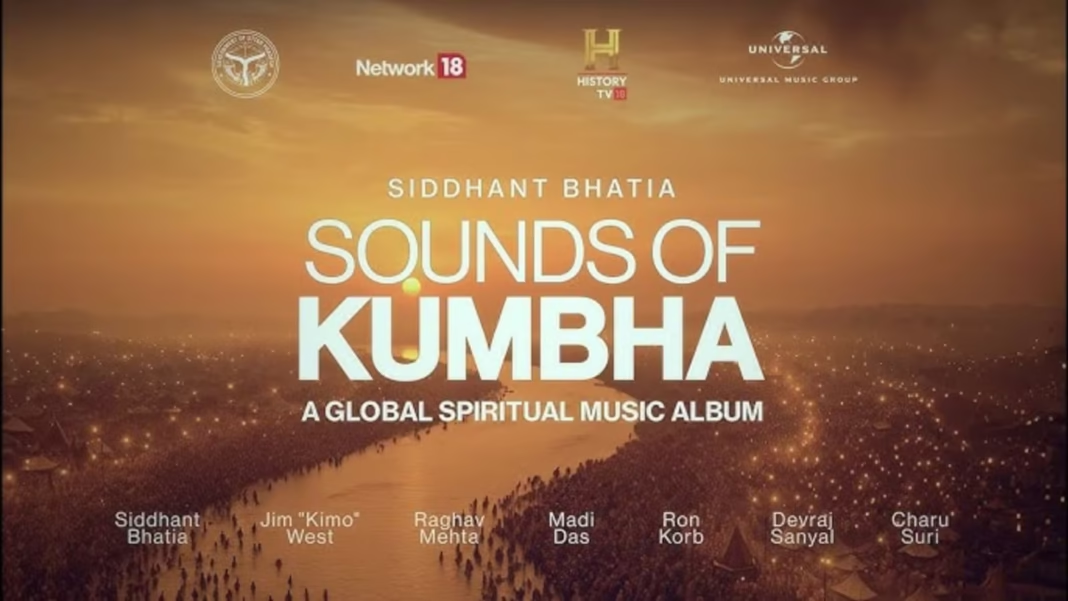Network18’s Sounds of Kumbha, a 12-track album celebrating India’s spiritual heritage, has been nominated for Best Global Music Album at the 68th Grammy Awards. Commissioned by Uttar Pradesh for the Mahakumbha and featuring over 50 global artists, it blends classical and devotional sounds to convey unity and peace through music.

When the riverbanks of Prayagraj turned into a sea of humanity earlier this year, few could have imagined that the chants, conches, and devotional rhythms of the Mahakumbha would soon echo across the world’s biggest stage for music. But that’s exactly what has happened with Sounds of Kumbha—Network18’s sweeping 12-track musical odyssey celebrating India’s spiritual grandeur—which has now earned a prestigious nomination at the 68th Grammy Awards in the Best Global Music Album category.
Commissioned by the Government of Uttar Pradesh as a cultural tribute to the Mahakumbha, and distributed globally by Universal Music India, the album is more than a musical project—it’s a sonic pilgrimage. It brings together over 50 artists from India and across continents, weaving a seamless tapestry of classical, devotional, and global sounds that reflect the soul of the world’s largest gathering of humanity.
A Symphony Born from Faith
The Mahakumbha, held every 12 years at Prayagraj, is not just a festival—it’s a confluence of faith, tradition, and transcendence. This year, it drew an astonishing 600 million pilgrims, reaffirming its place as the world’s most significant spiritual congregation.
Sounds of Kumbha set out to translate that collective energy into music—bridging ancient chants with contemporary global soundscapes. Recorded across continents, from Indian temples to international studios, the album captures both the intimacy of prayer and the immensity of the gathering.
At its heart lies a message that is both timeless and universal—“Vasudhaiva Kutumbakam”, meaning One Earth, One Family, One Future. Each track echoes this spirit of unity and peace, transforming the sacred energy of the Kumbha into a global anthem of togetherness.
The Maestros Behind the Music
The creative force behind Sounds of Kumbha is as diverse as its vision. Conceived and produced by Siddhant Bhatia, the album features collaborations with Grammy-winning artists and celebrated Indian musicians including Jim “Kimo” West, Madi Das, Ron Korb, Charu Suri, Raghav Mehta, and Devraj Sanyal.
The ensemble of performers reads like a who’s who of global music excellence—Ravi Shankar, Bhanumathi Narasimhan, Raja Kumari, Kanika Kapoor, Aditya Gadhvi, Kala Ramnath, V. Selvaganesh, Yashraj, and Pravin Godkhindi among others. Together, they have created a rare synthesis where Hindustani classical meets world fusion, and ancient Sanskrit mantras find harmony with contemporary rhythms.
Each song, layered with traditional instruments like the sitar, bansuri, and mridangam, flows seamlessly into orchestral arrangements and modern production, reflecting the meeting of the sacred and the modern.
“One Light, One Spirit”
For Ravi Shankar, one of the featured artists, the album’s message transcends music. “The whole world is one human family, and we belong to one light, one spirit,” he said. “This message comes alive through the music of Sounds of Kumbha.”
Producer Siddhant Bhatia sees the Grammy nomination as more than recognition—it’s affirmation. “The Mahakumbha united over 500 million souls in prayer and purpose,” he said. “Its recognition on the Grammy stage reminds us that faith and music together can heal, unite, and uplift our world.”
The Making of a Global Offering
Creating Sounds of Kumbha was a logistical and creative feat. With artists spread across countries and time zones, the production involved months of remote collaboration, live recordings, and digital integrations. Each artist was encouraged to bring their own interpretation of faith and unity, resulting in tracks that range from meditative chants to soaring orchestral movements.
The album’s thematic flow mirrors the pilgrimage itself—from the sound of the dawn aarti at the Ganga to the crescendo of collective prayer at the Sangam. It captures the rhythm of a journey that is both physical and spiritual, echoing the cyclical nature of life, devotion, and rebirth.
A Cultural Bridge to the World
While Sounds of Kumbha is deeply rooted in Indian tradition, its appeal lies in its universality. The blend of global sounds ensures that even listeners unfamiliar with the Mahakumbha can feel its emotional depth.
Distributed by Universal Music India, the album has already found audiences in over 40 countries, positioning it as one of India’s most ambitious cultural exports in recent years. For global listeners, it offers a window into India’s spiritual ethos; for Indians, it’s a moment of pride—seeing an ancient festival reimagined for a contemporary world.
The Grammy Moment
The nomination at the 68th Grammy Awards places Sounds of Kumbha in the company of some of the world’s finest musical works. But for the creators, the real triumph lies in the fact that a project born from prayer and purpose is now resonating with global audiences.
It’s rare for a cultural project so deeply tied to faith to break into the international mainstream without compromise. Yet, Sounds of Kumbha does so effortlessly—proving that spirituality and modern artistry can coexist, even flourish, on the same stage.
A Festival Finds Its Voice
For centuries, the Mahakumbha has existed as a living embodiment of devotion—millions gathering in faith, seeking purification, unity, and divine connection. With Sounds of Kumbha, that spirit has found a new medium: sound.
The album turns the river’s flow, the devotee’s chant, and the silence between rituals into music that speaks a universal language. In doing so, it bridges ancient India with a global present—reminding the world that the essence of the Kumbha is not just in its rituals, but in its resonance.
Harmony Beyond Borders
As Sounds of Kumbha heads to the Grammy stage, it carries more than melodies—it carries a message. A message that faith can be a bridge, not a boundary; that music can be prayer; and that in the noise of a divided world, harmony still has a place.
India’s eternal festival of peace and devotion has found its new, timeless voice—one that rises from the banks of the Ganga to the ears of the world, singing softly but powerfully: we are one.
Discover more from Creative Brands
Subscribe to get the latest posts sent to your email.






